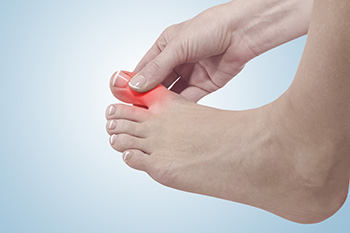

Gout is a form of arthritis characterized by sudden, severe pain, redness, and swelling in the joints, most commonly affecting the big toe, a condition known as podagra. It occurs when high levels of uric acid in the blood form sharp crystals that accumulate in joints. Symptoms often include intense joint pain that typically occurs at night, lingering discomfort, inflammation, and limited range of motion. Causes of gout include a diet high in purines, found in red meat and seafood, excessive alcohol consumption, obesity, and certain medical conditions like hypertension and kidney disease. Men, postmenopausal women, and people with a family history of gout are at higher risk. Gout attacks, or flare-ups, can recur if underlying causes are not addressed. Prevention strategies involve maintaining a healthy diet, staying hydrated, limiting alcohol intake, and managing body weight. If you suspect you have gout in your big toe, it is suggested that you schedule an appointment with a podiatrist for a diagnosis, treatment, and a long-term management plan to prevent joint damage and improve quality of life.
Gout is a painful condition that can be treated. If you are seeking treatment, contact Dr. Alan J. Spector from Shore Podiatry. Our doctor will treat your foot and ankle needs.
What Is Gout?
Gout is a form of arthritis that is characterized by sudden, severe attacks of pain, redness, and tenderness in the joints. The condition usually affects the joint at the base of the big toe. A gout attack can occur at any random time, such as the middle of the night while you are asleep.
Symptoms
Risk Factors
Prior to visiting your podiatrist to receive treatment for gout, there are a few things you should do beforehand. If you have gout you should write down your symptoms--including when they started and how often you experience them, important medical information you may have, and any questions you may have. Writing down these three things will help your podiatrist in assessing your specific situation so that he or she may provide the best route of treatment for you.
If you have any questions, please feel free to contact our office located in Point Pleasant, NJ . We offer the newest diagnostic and treatment technologies for all your foot care needs.